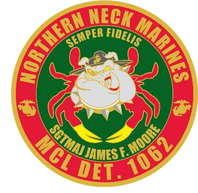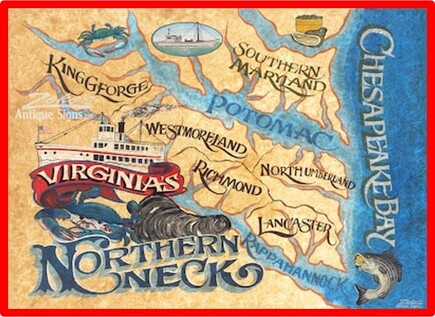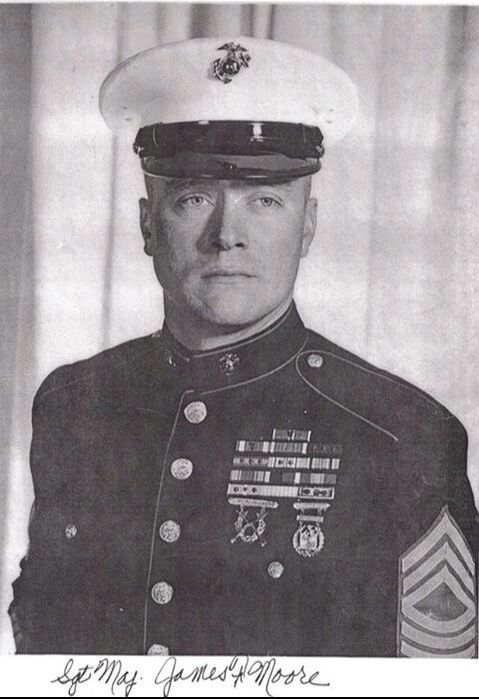SgtMaj James F. MooreBelow is brief history of the Marine we choose to honor, by naming our Detachment after him.
Moore enlisted in the Marine Corps in February, 1942, and was shipped overseas the following December, to the Pacific area in World War II. He participated in the Bougainville and Guam campaigns, as well as the one on Iwo Jima. The Long Island Daily Press, a New York paper, on Thursday May 17, 1945, had the following head line, and story, giving accounts of Moore's actions. MARINE CORPORAL FROM JAMAICA BLASTS JAPANESES OUT OF PILL BOX Marine Corporal James F. Moore, 19, son of Mrs. Alice G Moore of Jamaica, blasted four Japanese out of a pill box and killed a Japanese with a pistol during the bitter fighting in Iwo Jima. Corporal Moore, a demolition man with a company of the 21st Marine Regiment of the Third Marine Division, was in on the big push for Motoyama Airfield Number Two on D-Day-plus four. He was a member of a platoon ordered to destroy three pillboxes situated 200 yards beyond the defense lines of the Marine Regiment. The pill boxes were staggered on a hill 150 feet apart. Each squad was assigned to destroy one of the pillboxes. During a lull in a heavy Japanese artillery barrage, Moore with his squad made a frontal assault on the first pill box. Machine-gun fire from inside the pillbox killed one of the squad members and wounded two more as the Marines advanced through a gully towards the pillbox. Twenty yards from the pillbox, members of the squad threw hand grenades at the cement fortress. The Japanese lobbed hand grenades back to the Marines. |
Moore called for his assistant with a flame thrower. The flame thrower failed to operate. Moore said: "I knew then that I would have to do the job alone. I guess it was a silent order." Armed with 20 blocks of TNT attached to the end of a pole, Moore advanced to within feet of the pill box. He ignited the fuse and threw the charge in to an underground opening leading to a anti-aircraft gun emplacement. Four Japanese inside two pill box were killed. Moore's squad then joined the two other squads, aiding into destruction of the two remaining pillboxes. Four Marines were killed and five wounded in taking of the three pill boxes.
Upon another occasion, Corporal Moore, standing watch in a foxhole, saw a Japanese emerge from a brush pile near the command post. Taking his personal side arm, an old cavalry--type 45 calibre revolver, he fired at the Japanese who was 20 yards away. Wounded they fell to the ground. He arose and staggered within 15 yards of Moore's foxhole. A second shot struck the Japanese in the head, killing him instantly. The dead Japanese had two hand grenades clutched in his hands.
Moore was one of three men in his company who underwent the Iwo battle without suffering any battle wounds.
Corporal Moore was awarded the Bronze Star Medal for heroism during the battle for Iwo Jima. After the war, and when he returned to the States, Moore served as an honor guard escorting fallen comrades home to their family and burial at home. He helped console the families and showed them Marines care for each other.
When the Korean war was in progress, he served in Korea, freezing his butt at the Chosin Reservoir. It was there he contacted rheumatic fever, and spent many months in St. Albans Naval Hospital.
He then went "Sea Going" serving aboard the USS Wilkes-Barre. While at sea they sailed around the world on a "Good Will Cruise." During this cruise he participated in the Honor Guard at King Christian of Denmark's funeral.
After that, he spent many years recruiting for the Marine Corps in the Tri-State area. He retired after thirty years service, but died at a young age, probably shortened by ills contacted in the Pacific. By all records he was a "Marines Marine."
Upon another occasion, Corporal Moore, standing watch in a foxhole, saw a Japanese emerge from a brush pile near the command post. Taking his personal side arm, an old cavalry--type 45 calibre revolver, he fired at the Japanese who was 20 yards away. Wounded they fell to the ground. He arose and staggered within 15 yards of Moore's foxhole. A second shot struck the Japanese in the head, killing him instantly. The dead Japanese had two hand grenades clutched in his hands.
Moore was one of three men in his company who underwent the Iwo battle without suffering any battle wounds.
Corporal Moore was awarded the Bronze Star Medal for heroism during the battle for Iwo Jima. After the war, and when he returned to the States, Moore served as an honor guard escorting fallen comrades home to their family and burial at home. He helped console the families and showed them Marines care for each other.
When the Korean war was in progress, he served in Korea, freezing his butt at the Chosin Reservoir. It was there he contacted rheumatic fever, and spent many months in St. Albans Naval Hospital.
He then went "Sea Going" serving aboard the USS Wilkes-Barre. While at sea they sailed around the world on a "Good Will Cruise." During this cruise he participated in the Honor Guard at King Christian of Denmark's funeral.
After that, he spent many years recruiting for the Marine Corps in the Tri-State area. He retired after thirty years service, but died at a young age, probably shortened by ills contacted in the Pacific. By all records he was a "Marines Marine."




